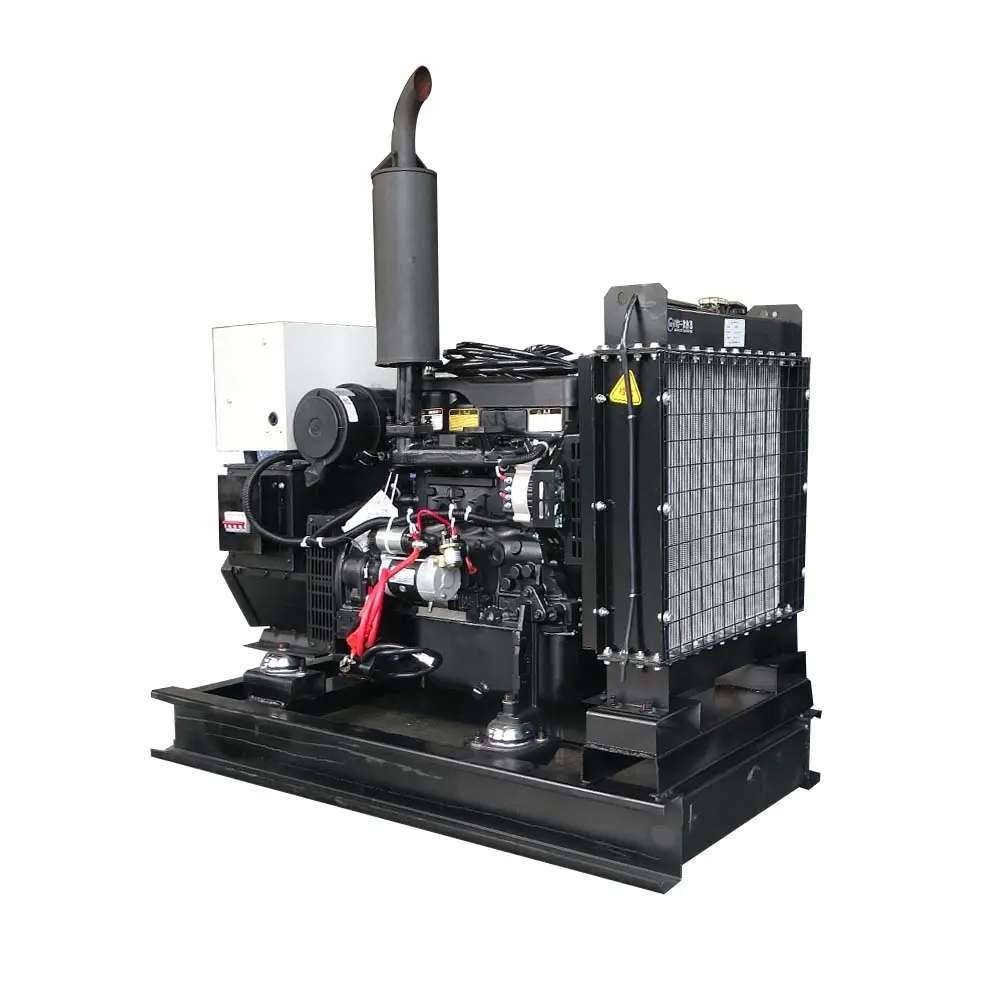Які найпоширеніші проблеми малих дизель-генераторів і як їх усунути?
Малі дизельні генератори широко використовуються в побутових, комерційних і промислових умовах як надійні джерела резервного живлення. Вони користуються попитом завдяки своїй міцності, ефективності витрат палива та здатності витримувати великі навантаження порівняно з іншими системами автономного живлення. Однак, як і будь-яке механічне обладнання, малі дизельні генератори не застраховані від поломок. Щоб забезпечити тривалий термін служби та надійну роботу, важливо знати поширені проблеми, з якими стикаються ці генератори, і вміти ефективно їх вирішувати.
Розуміння ролі малих дизельних генераторів
Малі дизельні генератори зазвичай обирають для місць, де електромережа є ненадійною або недоступною. Їх використовують на будівельних майданчиках, у сільських будинках, для аварійного резервування в лікарнях або бізнесі, а також навіть у мобільних застосуваннях, таких як автодоми чи човни. Компактна конструкція полегшує встановлення, а дизельні двигуни, як правило, мають більш тривалий термін служби порівняно з бензиновими двигунами.
Чому обслуговування є критичним
Незважаючи на те, що малі дизельні генератори є міцними, постійне використання без обслуговування призводить до зносу. Багато проблем виникає не через конструктивні недоліки, а через погане обслуговування, неправильну експлуатацію або вплив навколишнього середовища. Розуміння профілактичних і коригувальних заходів забезпечує безперебійну роботу.
Поширені проблеми з малими дизельними генераторами
Проблеми з запуском
Однією з найпоширеніших проблем, з якими стикаються користувачі, є складність запуску генератора. Це може бути викликано слабкою батареєю, несправним стартером, забитою паливною системою або навіть низькою температурою навколишнього середовища, що впливає на запалювання дизельного палива.
Забруднення паливної системи
Дизельне паливо з плином часу може погіршуватися та накопичувати воду, бруд або мікробне забруднення. Забруднене паливо призводить до забиття фільтрів, проблем із форсунками та поганої ефективності згоряння. Це поширена проблема в генераторах, які довго зберігаються без регулярного використання.
Перегрівання під час роботи
Маленькі дизельні генератори можуть перегріватися, якщо система охолодження забита, рівень мастила занадто низький або обмежено повітрообмін навколо двигуна. Перегрівання може призвести до серйозних пошкоджень двигуна та скоротити термін його служби.
Проблеми з мастилом і змащуванням
Витік мастила, недостатнє змащування або використання неправильної марки мастила може викликати внутрішнє зношування. Недостатнє змащування прискорює тертя між рухомими частинами і згодом може призвести до заклинювання двигуна.
Коливання електричного виходу
Генератори можуть іноді виробляти нестабільну напругу або частоту. Це часто викликано несправністю генератора, поганим управлінням навантаженням або зношеними щітками. Нестабільний вихідний сигнал може пошкодити чутливі електронні пристрої, підключені до генератора.
Надмірний шум і вібрація
Хоча дізнавальні генератори відомі тим, що є більш шумними, ніж інші типи, аномальний шум або вібрація зазвичай вказують на механічні проблеми. Ослаблені компоненти, неправильно встановлені підшипники або стукіт двигуна, викликаний неправильним згорянням палива, можуть спричинити цю проблему.
Проблеми з вихлопними газами
Колір вихлопних газів дає підказку щодо стану генератора. Чорний дим вказує на надлишок палива, білий дим свідчить про неповне згоряння або витік охолоджувальної рідини, а синій дим означає згоряння мастила. Кожен з цих станів вимагає різних рішень.
Як усунути несправності малих дизельних генераторів
Вирішення проблем з запуском
Перевірте заряд акумулятора та переконайтеся, що клеми чисті й міцно затягнуті. Замініть акумулятор, якщо він старий або несправний. У разі холодної погоди використання нагрівача двигуна або дизельного палива зимового класу може покращити запуск двигуна.
Запобігання та боротьба з забрудненням палива
Спустіть старе паливо та замініть його на чисте дизельне. Використовуйте стабілізатори палива для тривалого зберігання та встановлюйте фільтри високої якості, щоб заблокувати потрапляння бруду та води в систему. Періодичне очищення паливного бака також зменшує накопичення мікроорганізмів.

Вирішення проблеми перегріву
Перевірте систему охолодження, очистіть радіатор і переконайтеся, що рівень мастила достатній. Регулярно перевіряйте вентилятори та ремені на зношеність і замінюйте їх за потреби. Завжди використовуйте генератор у добре провітрюваному приміщенні, щоб уникнути накопичення тепла.
Вирішення проблем з мастилом
Перевіряйте рівень мастила перед кожним використанням і замінюйте його згідно з рекомендаціями виробника. Завжди використовуйте мастило правильного класу для вашої моделі генератора. Слідкуйте за витоками та негайно їх усувайте, щоб уникнути тривалого пошкодження.
Стабілізація електричного виведення
Перевірте генератор і замініть пошкоджені щітки або регулятори. Уникайте раптових великих змін навантаження, поступово керуючи підключеними пристроями. Для чутливих електронних пристроїв, використання генератора разом із автоматичним регулятором напруги (AVR) або системою безперебійного живлення (UPS) може запобігти пошкодженню.
Зменшення шуму та вібрації
Підтягніть болти, які ослабли, і перевірте місця кріплення на стабільність. Зношені або неправильно встановлені підшипники слід замінити. Використання матів і корпусів, що поглинають вібрацію, також може звести до мінімуму експлуатаційний шум у житлових приміщеннях.
Керування проблемами вихлопних газів
Чорний дим можна усунути, відрегулювавши паливні форсунки та очистивши повітряні фільтри. Білий дим може вимагати перевірки головки блоку циліндрів, форсунок або системи охолодження. Синій дим часто вказує на зношені поршневі кільця або клапанні ущільнення, що може вимагати професійного обслуговування.
Профілактичне обслуговування для тривалої роботи
Щоб звести до мінімуму поломки, невеликі дизельні генератори мають обслуговуватися за звичною схемою. Це включає перевірку рівня рідин, огляд фільтрів, тестування акумуляторів і періодичний запуск генератора під навантаженням для підтримки активності всіх систем. Профілактичне обслуговування подовжує термін служби генератора та забезпечує надійність у разі надзвичайних ситуацій.
Важливість професійного обслуговування
Хоча деякі завдання з технічного обслуговування може виконати користувач, наприклад заміна оливи або фільтрів, складні проблеми, такі як калібрування паливних форсунок, перемотка статора або ремонт двигуна зсередини, краще залишити сертифікованим технікам.
Правила зберігання
Якщо генератор не використовується регулярно, правильне зберігання є критичним. Воно включає в себе злив старого палива, зберігання агрегату під укривним матеріалом і періодичний запуск для запобігання заїданню механічних частин.
Цінність малих дизельних генераторів незважаючи на проблеми
Хоча малі дизельні генератори можуть мати певні проблеми, їхня надійність, ефективність і здатність працювати тривалий час роблять їх високоякісним рішенням для забезпечення електроживлення. За належного обслуговування та своєчасного ремонту ці установки можуть стабільно працювати протягом багатьох років.
ЧаП
Як часто потрібно обслуговувати малі дизельні генератори?
Регулярне обслуговування слід проводити кожні 250–500 годин роботи, залежно від рекомендацій виробника. Однак перед кожним використанням сильнорекомендується перевіряти рівень мастила, охолоджувальної рідини та фільтрів.
Чи можуть малі дизельні генератори працювати безперервно?
Так, вони можуть працювати тривалий час, але рекомендується давати їм перепочинок після кількох годин роботи, щоб уникнути перегрівання та надмірного зносу. Під час тривалої роботи завжди слід контролювати рівень мастила та охолоджувальної рідини.
Чому мій малий дизельний генератор споживає більше палива, ніж очікувалося?
Надмірне споживання палива може бути викликане забитими фільтрами, поганою якістю палива або перевантаженням генератора понад його номінальну потужність. Регулярне обслуговування та правильне управління навантаженням може допомогти зменшити витрату палива.
Чи безпечне використання малих дизельних генераторів у приміщенні?
Ні, їх небезпечно використовувати всередині, тому що вони виділяють чадний газ. Завжди розміщуйте генератор у добре провітрюваному зовнішньому місці, забезпечивши його захист від дощу або прямих сонячних променів.
Який звичайний термін служби малих дизельних генераторів?
За належного догляду та обслуговування міні-дизельні генератори можуть працювати від 10 000 до 30 000 годин. Це відповідає 10–15 рокам надійної роботи, залежно від режиму використання.
Зміст
- Які найпоширеніші проблеми малих дизель-генераторів і як їх усунути?
- Розуміння ролі малих дизельних генераторів
- Поширені проблеми з малими дизельними генераторами
- Як усунути несправності малих дизельних генераторів
- Профілактичне обслуговування для тривалої роботи
- Цінність малих дизельних генераторів незважаючи на проблеми
-
ЧаП
- Як часто потрібно обслуговувати малі дизельні генератори?
- Чи можуть малі дизельні генератори працювати безперервно?
- Чому мій малий дизельний генератор споживає більше палива, ніж очікувалося?
- Чи безпечне використання малих дизельних генераторів у приміщенні?
- Який звичайний термін служби малих дизельних генераторів?

